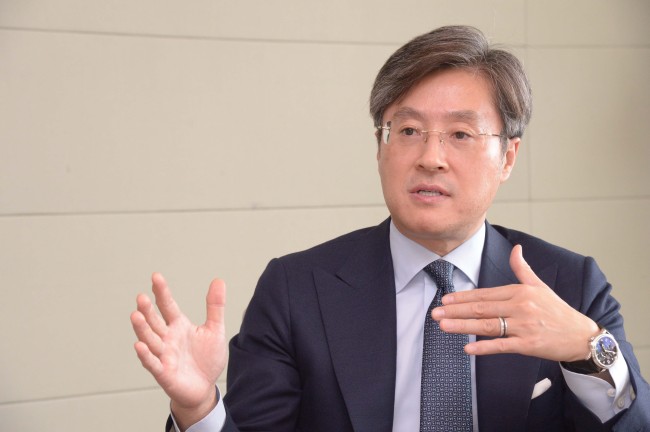More and more Korean firms are facing lawsuits over trade secret infringement and it is time the companies put in place measures to tackle such cases of economic espionage, said the head of a global law firm in Seoul.
“Korean firms should also change their perception toward intellectual property rights and consider it a revenue source rather than cost, and aggressively pursue litigations against the violators,” Kim Jong-han, chief representative of South Korea at Paul Hastings, told The Korea Herald.
“I say Korea is a powder keg when it comes to trade secret misappropriation. I think many of the the top 50 business conglomerates here cannot be free from suspicions of such violation,” Kim said.
“Korean firms should also change their perception toward intellectual property rights and consider it a revenue source rather than cost, and aggressively pursue litigations against the violators,” Kim Jong-han, chief representative of South Korea at Paul Hastings, told The Korea Herald.
“I say Korea is a powder keg when it comes to trade secret misappropriation. I think many of the the top 50 business conglomerates here cannot be free from suspicions of such violation,” Kim said.

Recent years have seen a growing number of lawsuits against local firms by foreign companies.
In 2014, steel powerhouse POSCO settled a case with the Nippon Steel & Sumimoto Metal Corporation over infringement allegations for 295 billion won ($259 million), while SK hynix settled a case with Toshiba and San Disk over the same allegations for about 300 billion won, and a series of contracts for cooperation, respectively. In May, Kolon settled with U.S. chemical giant DuPont over IP violation including trade secrets for $275 million.
Kim, whose team participated in several of these landmark cases ― including that of Kolon and SK ― said that trade secret misappropriation cases are detrimental because the amount of compensation is higher and they are classified as criminal rather than civil cases.
“The amount of recent settlements goes into hundreds of millions of dollars. And if you lose a criminal case in trade secrets, the civil suits that follow will demand huge amounts as compensation because you have already admitted to the wrongdoing. This can devastate any company,” Kim said.
The California lawyer said he understands that perhaps what could be seen as trade secret misappropriation is inevitable here.
“When South Korea decided to focus on the heavy industries-oriented economic development throughout the 1970s, ’80s and ’90s, the fastest way was to invite people who had the skills, technology and experience. The retirees or those who quit from leading global companies were hired as senior advisors or technical heads, sharing their knowledge and producing the fruits, bringing Korean companies to where they are,” Kim said.
“But now that such companies have advanced into the global scene, the original technology developers feel that they are losing profits for the wrong reasons. So now, things are all coming back to the Korean firms,” Kim said.
The California lawyer said while the numbers of such global litigations and domestic legal battles are increasing, settlements out of court or before filing a lawsuit are also on the rise. “I get a lot of consultation requests from executives worried whether they will get sued,” he said.
“Because the U.S. government has become stricter in this territory ― U.S. President Barack Obama vowed stricter regulations ― even hiring former workers could be regarded as economic espionage. It is time that the Korean businessmen take this issue carefully and seriously come up with ways to tackle it,” he said.
Explaining the legitimate experience that a former worker of an IP holder can share, he noted, “If your new employer wants you to draw up a design or come up with a magic formula right away, it is trade secret stealth. However, if you adapt the skills you have learned into creating products that are different from the things that you have made ― which requires your past experience to help you design but does not affect your future creations directly ― you may avoid the allegation,” he said.
Kim, who has led several high-profile IP litigations in Korea, noted that local companies should also take advantage of their IPRs.
“Many companies think IP management is an additional cost but if you can spot the violators of your own property, file lawsuits and win compensation, this could be a good revenue source,” he said.
“Many foreign companies say that Korean companies are very passive in IP protection. But once they know this could guarantee money, they will change their mind,” he said.
By Bae Ji-sook (baejisook@heraldcorp.com)
-
Articles by Korea Herald




![[Weekender] Pet food makers bet big on ‘recession-free’ pet food market](http://res.heraldm.com/phpwas/restmb_idxmake.php?idx=644&simg=/content/image/2024/05/10/20240510050754_0.jpg&u=20240512145510)




![[LLG] Unseen inheritance: Trauma of transnational adoption 'trickles down' to adoptees' children](http://res.heraldm.com/phpwas/restmb_idxmake.php?idx=644&simg=/content/image/2024/05/12/20240512050141_0.jpg&u=20240512163544)
![[Drama Tour] Romantic trip to ‘Queen of Tears’ filming spots](http://res.heraldm.com/phpwas/restmb_idxmake.php?idx=644&simg=/content/image/2024/05/09/20240509050798_0.jpg&u=20240511190213)








